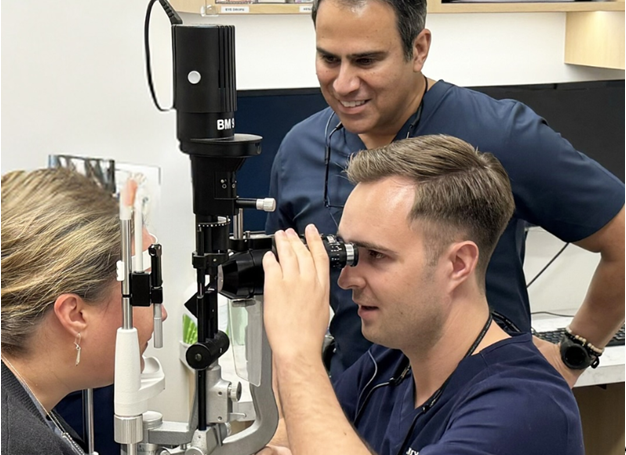Your eyes feel tired, don’t they? That gritty, strained feeling at the end of the day is all too common. It feels like your vision is working overtime with no breaks. You might think it’s just part of modern life, but you can change that story.
With a few simple healthy eye hacks, you can make a huge difference in how your eyes feel. You just need to know where to start. Taking care of your vision doesn’t have to be complicated or expensive. It’s about small, consistent choices that add up over time.
These easy-to-follow healthy eyes hacks can protect your sight and reduce daily discomfort. And if issues persist, visiting a trusted eye clinic or consulting an experienced eye specialist in Calgary can help you maintain long-term eye health.
Feed Your Eyes the Right Stuff
You already know that what you eat affects your body, and your eyes are no different. They need specific nutrients to function at their best. Giving them the right fuel is one of the easiest ways to support long-term vision health and prevent common eye problems.
Vitamins for Vision
Certain vitamins are absolute powerhouses for your eyes. Vitamins A, C, and E are critical for good eyes. They help protect your eyes from damage and age-related problems.
Vitamin A is vital for good vision, especially in low light. Carrots are famously full of it, but so are sweet potatoes and leafy greens. Many people associate carrots with eye health, and the combination of carrots and red peppers provides an excellent source of this nutrient.
Vitamin C, an antioxidant, helps lower your risk of developing cataracts. You can get it from various citrus fruits like oranges and grapefruits, as well as strawberries. Vitamin E works with other antioxidants to fight oxidative stress and keep your eye cells healthy.
The Power of Pigments
Have you heard of lutein and zeaxanthin? These are pigments found in high concentrations in your retinas. They act like an internal pair of sunglasses, filtering out harmful blue light and helping to protect against conditions like macular degeneration.
Finding these nutrients is easy. Look for dark, green leafy vegetables like kale, spinach, and collard greens. They are packed with both lutein and zeaxanthin, which is why a diet rich in leafy vegetables is so often recommended for eye health.
Adding these to your daily meals can strengthen your eyes’ natural defenses. A simple salad or a side of greens can do a world of good. It is a delicious way to practice good eye care.
Key Nutrients for Your Eyes
Beyond the basics, other nutrients like zinc and omega-3s are very important. Zinc helps vitamin A create a pigment called melanin, which protects your eyes. Omega-3 fatty acids are critical for the health of your retinas and can help prevent dry eyes.
To make it easier, here is a quick guide to some of the best foods for your eyes:
| Nutrient | Why It’s Good for Eyes | Food Sources |
| Vitamin A & Beta-carotene | Protects the cornea and helps with night vision. | Carrots, red peppers, sweet potatoes, spinach |
| Lutein & Zeaxanthin | Filters harmful blue light, reducing the risk of chronic eye diseases. | Kale, spinach, collard greens, broccoli, eggs |
| Vitamin C | An antioxidant that lowers the risk of cataracts and macular degeneration. | Citrus fruits, strawberries, and bell peppers |
| Vitamin E | Protects cells in the eyes from damage by free radicals. | Almonds, sunflower seeds, peanuts, and avocado |
| Omega-3 Fatty Acids | Supports retinal function and helps prevent dry eye symptoms. | Oily fish (salmon, tuna, sardines), flaxseeds, walnuts |
| Zinc | Helps transport vitamin A from the liver to the retina. | Oysters, beef, pumpkin seeds, chickpeas |
Including these foods regularly in your diet helps keep your eyes healthy. A balanced diet supports the delicate blood vessels in your eyes and can reduce the risk of serious eye diseases like cataracts and macular degeneration.
Beat Digital Eye Strain with Smart Screen Habits
We live our lives in front of screens. Computers, phones, and tablets are everywhere. All that screen time can lead to digital eye strain, with symptoms like headaches, blurry vision, and tired, dry eyes.
You can fight back against this modern problem without quitting your job or giving up your phone. A few smart adjustments to your habits can provide major relief. Your viewing habits for the TV screen matter too, so apply these principles there as well.
Practice the 20-20-20 Rule.
This might be the most famous healthy eyes hack, and for good reason. It is simple and it works. The Rule is easy to remember and follow throughout your day.
Every 20 minutes, take a 20-second break and look at something 20 feet away. This simple action relaxes the focusing muscles inside your eyes. This gives them a much-needed rest from staring at a close-up screen.
Beyond just looking away, you can perform simple eye exercises during this break. Gently roll your eyes in circles, or focus on a distant object and then a near one. This helps improve flexibility and reduce strain.
Adjust Your Digital Environment
Your screen setup has a huge effect on eye comfort. Staring at a screen that is too bright is like looking into a light bulb. Adjust your screen brightness to match the lighting in your room.
Position your monitor correctly. The screen should be about an arm’s length away. The top of the screen should be at or slightly below your eye level to help both your eyes and neck.
Also, think about glare from windows or overhead lights, as it can make seeing the screen difficult. Try using an anti-glare screen filter. Or simply adjust the angle of your monitor to reduce reflections.
Remember to Blink
This sounds almost too simple, but it is incredibly important. Studies show that we blink much less often when using screens. This leads directly to irritated, dry eyes.
Blinking is how your eyes stay moist and clear of debris. Make a conscious effort to blink more frequently. Each full blink spreads a fresh layer of tears over your eye’s surface.
If your eyes still feel dry, try using preservative-free artificial tears, also known as eye drops. You can get them over the counter. They can help supplement your natural tear production during long sessions of screen work.
The Importance of Regular Eye Exams
One of the most critical healthy habits for your vision is scheduling a regular eye exam. Many people wait until they experience vision problems to see an eye doctor. However, routine eye exams are essential for early detection and prevention.
An eye exam can spot serious eye disease in its earliest stages, often before you notice any symptoms. Conditions like glaucoma, diabetic retinopathy, and macular degeneration can cause irreversible vision loss if not treated early. Your eye doctor can also check for other issues like color blindness or crossed eyes, which is particularly important for young children.
Furthermore, an eye exam is a window into your overall health. Your eye doctor can see the blood vessels in your retina, which can reveal signs of high blood pressure, diabetes, and high cholesterol. Catching these systemic issues early can be life-saving.
As you age, you may develop a condition called presbyopia, which makes it harder to focus on close objects. Your eye doctor can prescribe reading glasses to help with this. Regular visits to eye doctors help you manage these changes and maintain the best possible vision.
Smart & Simple Lifestyle Hacks for Your Eyes
Beyond diet and screen time, your daily habits matter a lot. Some simple lifestyle changes can have a profound impact. They protect your eyes from damage and keep them working well for years.
Prioritize a Good Night’s Sleep
Sleep is when your body repairs and recharges itself, including your eyes. While you sleep, your eyes get a continuous bath of lubricating fluids. They also clear out irritants like dust or smoke that have built up during the day.
A lack of sleep can lead to problems. You might experience twitching, dryness, and light sensitivity. Getting seven to nine hours of quality sleep per night is one of the best things you can do for your eyes.
If You Smoke, Make a Plan to Quit
The habit of smoking is devastating for your health, and your eyes are no exception. Smokers are at a much higher risk of developing serious eye conditions. These conditions can lead to vision loss.
Smoking significantly increases your risk of cataracts and age-related macular degeneration (AMD). It can also damage the optic nerve, which connects your eye to your brain. This damage can contribute to glaucoma, a serious eye disease.
The best step you can take is to quit smoking. Many resources are available to help you quit. Your doctor can give you guidance and support on this journey.
Stay Active and Maintain a Healthy Weight
Regular physical activity is wonderful for your entire body, including your eyes. Exercise improves blood circulation, which helps deliver oxygen and nutrients to the delicate structures of the eye. Maintaining a healthy weight is also crucial for eye health.
Obesity increases the risk of developing type 2 diabetes, which is a leading cause of blindness in adults. Diabetic retinopathy is an eye disease that damages the blood vessels in the retina. Keeping your blood sugar levels in check is vital for protecting your sight.
A healthy lifestyle with regular physical activity can also help manage high blood pressure. High blood pressure can damage the blood vessels in your eyes, leading to vision problems. Adopting these healthy habits is a proactive way to practice good eye care.
Drink Plenty of Water
Your body needs water to function properly. Dehydration can affect your eyes, leading to symptoms of dry eyes because your body does not have enough fluid to produce adequate tears.
Your tears are essential for clear vision and comfort. They keep the surface of your eye smooth and moist. When you are dehydrated, your eyes can feel gritty and sore.
Protecting Your Eyes from the Great Outdoors
We often think about protecting our skin from the sun. Your eyes need just as much protection. The sun’s rays, specifically ultraviolet (UV) rays, can cause serious long-term damage.
Wear Quality Sunglasses
Sunglasses are not just a fashion accessory; they are a critical tool for eye health. You need to choose a pair that offers real UV protection. When you wear sunglasses, you actively shield your eyes from harmful radiation.
Look for sunglasses that block 99% to 100% of both UVA and UVB radiation. The label should clearly state this. The color or darkness of the lens does not indicate its UV protection level, so you must check the label for proper protection from UV exposure.
This habit can help prevent cataracts and other conditions linked to cumulative sun damage. It is a simple action that offers a lifetime of benefits. Make sure your young children wear them too, as their eyes are even more sensitive.
Add a Hat for Extra Coverage
For even more protection, pair your sunglasses with a wide-brimmed hat. A hat can block a significant amount of the sun’s rays. It prevents them from reaching your eyes from above or around the sides of your glasses.
This is especially important during peak sun hours, typically between 10 a.m. and 4 p.m. This is also important when you play sports outdoors. A hat and sunglasses are a powerful combination for complete sun safety for your face and eyes.
Use Safety Eyewear When Needed
Eye injuries at home are very common, often happening during simple activities like yard work or home repairs. Flying debris can cause serious damage to your eyes. Protective eyewear is essential when doing any activity that could cause eye issues.
Wear protective eyewear whenever you’re doing these activities. Safety glasses can prevent painful and potentially blinding injuries. Keep a pair handy in your garage or with your tools so you always remember to use them.
Safe Habits for Contact Lens Wearers
If you wear contact lenses, proper hygiene is essential for healthy eyes. A contact lens sits directly on your eye, so any bacteria on it can easily cause an infection. Following your eye doctor’s instructions for care is non-negotiable.
Always wash your hands thoroughly with soap and water before you wear contact lenses or remove them. Use only the recommended solution to clean and disinfect your lenses; never use tap water or saliva. Replace your contact lens case every three months to avoid bacterial buildup.
Never sleep in your contacts unless they are specifically approved for overnight wear. Sleeping in a regular contact lens deprives your cornea of oxygen, increasing the risk of serious infections. Following these rules for when you wear contact lenses can prevent painful eye problems and protect your vision.
Makeup Tips for Healthy, Happy Eyes
If you wear makeup, your daily routine could be impacting your eye health. The skin around your eyes is extremely delicate. The products you use can introduce bacteria and cause irritation if you are not careful.
Keep Your Products Fresh and Clean
Eye makeup has a shelf life. Liquid products like mascara and liquid eyeliner are especially prone to bacterial growth. You should replace these items every three months.
Never share your eye makeup. Sharing products can easily spread infections like pink eye. Keep your own makeup brushes clean by washing them regularly with a gentle soap and water.
Always Remove Makeup Before Bed
Sleeping with makeup on is a major mistake. It can clog the tiny oil glands along your lash line. This can lead to inflammation and uncomfortable styes, a common eye issue.
Use a gentle, eye-safe makeup remover. Be careful not to scrub too hard on the delicate skin around your eyes. A clean face before bed is a recipe for healthier eyes and skin.
Conclusion
Your vision is precious, and taking care of it is one of the best investments you can make in your health. You do not need a huge, complicated plan. Starting with a few of these simple, healthy eye hacks can lead to more comfortable eyes and better long-term sight.
From eating a diet rich in green leafy vegetables to remembering your regular eye exam, each step contributes to your overall eye wellness. Protect your eyes from UV rays, practice smart screen habits, and handle your contact lenses with care. It is about building small, positive healthy habits that will serve you well for the rest of your life. For professional care, consider booking a check-up at a trusted eye clinic Calgary residents rely on.


